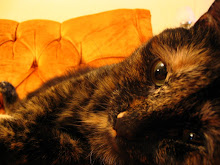I had decided that between 9pm and 10pm I would work on a cover letter and I'd write a 500 word essay on the topic of Why My Library is Important to Me for the contest of the same name. (Our current Toronto mayor is trying to cut 10% from every municipal program's budget and the Toronto Public Library workers' union is fighting back and holding a contest. Winners can win lunch with authors like Margaret Atwood and Michael Ondaatje.)
I stared at a blank page for a while and decided it would be easier to riff on why my library is important to me if I blogged it first.
So what is my library to me? It's not as if I don't own enough unread books.
It is, corny as it sounds, a sanctuary.
- A place to be surrounded by books without having people ask you if you need help.
- A place to read books without having to buy a coffee.
- A place that reminds me of all the things I have yet to learn. This sets it apart from the internet which constantly reminds me of all the things I wish I did not know.
- A place to research and study, and to cheaply photocopy pages to mark-up later.
- A place to be inspired by books that people leave on tables.
A public library (as opposed to a school library - though, those are important too) is place where a nerdy girl can sit and learn about the world without having to deal with peer pressure or fend off questions about 'how far she's gone with a boy'?
- A place to be around people without being really having to interact with them.
- A place that provides me with unending optimism for the human race. Every opportunity that a child does not discover at home or at school, they can still discover at their public library for free. Classical music, opera, films, novels, graphic novels, short stories, poetry, plays, magazines - a wealth of specific information that's been edited and peer-reviewed available for free!
The library is critical to my idea of a functioning society. It is like an intellectual safety net and vitally important to new immigrants learning English - and Toronto is mostly immigrants (including me). Is it naive and hopeful to think that at least Toronto's homeless can find something to read when they wake up from their nap at the Reference Library? Sure. But once the homeless or low-income are at the library, isn't it a relief to know that if they need to look up a shelter or go to a seminar on fighting bedbugs that help is available?
I believe in libraries because I believe in self-improvement and knowledge being power, or at least, that the withholding of knowledge leads to powerlessness. In the library I didn't have to call my mother constantly to quell her worrying, it was, in a way, the place I could be most free as a 13-year-old. I didn't have to divulge what I chose to look at or read. I grew up in a fairly well-read, liberal household, but if I'd grown up in a more closed-minded atmosphere, the library would be the place where I could safely explore beyond the limits that others set up. The library was an important part of my childhood and adolescence. And if I end up old and alone, the library (whether in building form, or mobile, with large-print and audio books) is where I will find the solace and comfort and company of books.
I guess Edward P. Morgan (in Clearing the Air, 1963) already said it better:
A book is the only place in which you can examine a fragile thought without breaking it, or explore an explosive idea without fear it will go off in your face. It is one of the few havens remaining where a man's mind can get both provocation and privacy.


















